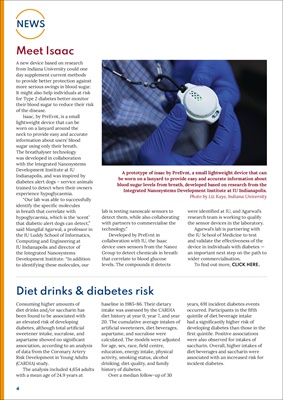
4
NEWS
A prototype of isaac by PreEvnt, a small lightweight device that can
be worn on a lanyard to provide easy and accurate information about
blood sugar levels from breath, developed based on research from the
Integrated Nanosystems Development Institute at IU Indianapolis.
Photo by Liz Kaye, Indiana University
Meet Isaac
A new device based on research
from Indiana University could one
day supplement current methods
to provide better protection against
more serious swings in blood sugar.
It might also help individuals at risk
for Type 2 diabetes better monitor
their blood sugar to reduce their risk
of the disease.
Isaac, by PreEvnt, is a small
lightweight device that can be
worn on a lanyard around the
neck to provide easy and accurate
information about users' blood
sugar using only their breath.
The breathalyser technology
was developed in collaboration
with the Integrated Nanosystems
Development Institute at IU
Indianapolis, and was inspired by
diabetes alert dogs - service animals
trained to detect when their owners
experience hypoglycaemia.
"Our lab was able to successfully
identify the specific molecules
in breath that correlate with
hypoglycaemia, which is the 'scent'
that diabetic alert dogs can detect,"
said Mangilal Agarwal, a professor in
the IU Luddy School of Informatics,
Computing and Engineering at
IU Indianapolis and director of
the Integrated Nanosystems
Development Institute. "In addition
to identifying these molecules, our
lab is testing nanoscale sensors to
detect them, while also collaborating
with partners to commercialise the
technology."
Developed by PreEvnt in
collaboration with IU, the Isaac
device uses sensors from the Nanoz
Group to detect chemicals in breath
that correlate to blood glucose
levels. The compounds it detects
were identified at IU, and Agarwal's
research team is working to qualify
the sensor devices in the laboratory.
Agarwal's lab is partnering with
the IU School of Medicine to test
and validate the effectiveness of the
device in individuals with diabetes -
an important next step on the path to
wider commercialisation.
To find out more, CLICK HERE.
Diet drinks & diabetes risk
Consuming higher amounts of
diet drinks and/or saccharin has
been found to be associated with
an elevated risk of developing
diabetes, although total artificial
sweetener intake, sucralose, and
aspartame showed no significant
association, according to an analysis
of data from the Coronary Artery
Risk Development in Young Adults
(CARDIA) study.
The analysis included 4,654 adults
with a mean age of 24.9 years at
baseline in 1985-86. Their dietary
intake was assessed by the CARDIA
diet history at year 0, year 7, and year
20. The cumulative average intakes of
artificial sweeteners, diet beverages,
aspartame, and sucralose were
calculated. The models were adjusted
for age, sex, race, field centre,
education, energy intake, physical
activity, smoking status, alcohol
drinking, diet quality, and family
history of diabetes.
Over a median follow-up of 30
years, 691 incident diabetes events
occurred. Participants in the fifth
quintile of diet beverage intake
had a significantly higher risk of
developing diabetes than those in the
first quintile. Positive associations
were also observed for intakes of
saccharin. Overall, higher intakes of
diet beverages and saccharin were
associated with an increased risk for
incident diabetes.